
Yvonne George had got an engagement in
London to sing at the Alhambra, and I had decided
to go to London anyway to try and collect some
money. Yvonne was a great friend of the Countess
A. 3 s and she said, " I will pay your train fare to
London if you will look after Yvonne. " We all met
" We all met
at the Gare du Nord. The Countess brought our
lunch with her, and two bottles of champagne.
When we got into the train, we discovered an old
friend of ours who said, " Are you having lunch on
the train? " We said, " No, we have got our lunch
with us. 59 He said, " Would you like some cham
pagne? " And we said, " Yes/ 5 We had our lunch
and he joined us afterwards, bringing some wine
with him. The Countess had engaged a cabin on the
boat for herself and Yvonne and they went below.
I wandered up to the bar. There I found Sachy
and Osbert Sitwell and
Sir Gerald du Maurier and
Sir James Dunn. We had a drink and I sat on the
deck with the Sitwells. It was a beautiful day and

the voyage was very agreeable. Yvonne had
arranged to stay at the Hotel Metropole In
Northum
berland Avenue.
The Countess had to stay with a
friend of hers. Yvonne and I went to the hotel. I
had a room on the fourth floor and she had a room
lower down. We were very tired and so we both
went to bed. 
The next morning about nine-thirty I went down
stairs and tapped on her door. The maid had
drawn the blinds and outside it was completely
dark. There was not actually a fog but an overhead
one and it was just as dark as night. Yvonne gave
a scream of horror and said, " This is dreadful, I
shall return to France at once! " I said, " Give me
some money and you will not want to return so
quickly I went to Soho and bought a bottle of
pre-war absinthe,
a copy of the Matin, and some
Maryland jaunes. When I arrived back we pushed
the bell and sent for the waiter and told him to bring
some ice. We drank a few absinthes and felt very
much better. The fog then lifted and we went to
the Alhambra, where she had to rehearse. I sat on
the stage and translated to the conductor. That
evening she appeared and had an enormous success.
After die first house, which I did not go to, but
waited for the second one, Yvonne returned to the
hotel, and, finding me alone, said, " Now take me
to somewhere amusing, not the Ritz or places like
that but somewhere that is amusing and unique/*
I had already been thinking of places to take her to
that would amuse and possibly astonish her. I said
that for the moment I had only three-and-sixpence.
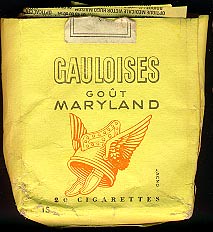
She had just got some money from the theatre and
produced a ten-pound note. At this time ten- or
even five-pound notes were not, I think, legal
tender, I looked in horror at it and said, " You
I looked in horror at it and said, " You
must get some change for that but she said that
it did not matter. I had a horrible presentiment
of the trouble that we might land in. We took
a taxi to Dirty Dick's in the City, near Liverpool
Street. 
I paid for the taxi which came to nearly
three-and-sixpence. Yvonne was delighted with
the City and could hardly believe that Dirty Dick's,
with the mummified cats and rats, existed. She
had not troubled to remove her stage make-up,
which really was very sensational: bright blue eye
lids and enormous eyelashes. All the local custo
mers, sailors, bank-clerks, and old ladies in shawls
stared in astonishment. We went in to the farthest
bar, where there are festoons of dead cats and rats,
old policemen's hats and huge keys, all covered
with dust. Dirty Dick was the son of a rich City
merchant and lived in the eighteenth century. He
was engaged to a young woman who had died on
the day of the wedding, and as he had sworn never
to wash again, he became known as " Dirty Dick."
All the cats from the neighbourhood crowded in
through the windows and died there, and he kept
a tavern. The port is very good there and we had
several glasses and some sandwiches. Yvonne was
blissfully happy. I was nervously watching the
clock and wondering what would happen when
the ten-pound note was produced. She saw the
time and she said 3 <c Mon Dieuje dois Stre a VAlhambra

en vingt minutes! " She asked for the bill. The
waiter looked at us as if we were crooks and sent
for the manager who looked worse, and I said,
" Stay here and give me the ten-pound note! "
I rushed up the staircase and into the arms of a
policeman. I said, " I am in Dirty Dick's with
the Star Turn of the Alhambra and we only have

a ten-pound note and the manager thinks we are
crooks and he won't change it." The policeman
smiled and said, " Well, Miss, I know it's a bit
*ard on two ladies like yourselves.
Take it to
the Great Eastern Hotel pointing out to me the
way to get there. I ran round the corner and asked
for the cashier. I was breathless by the time that I
arrived and gasped, " Dirty Dick's, Star Turn,
Alhambra, ten-pound note ! " and I wrote all this
information on the back of the note and he gave

me ten one-pound notes and we just got back in
time. 
Gwen Farrar above was acting on the same bill as
Yvonne. I went round to the theatre one day and
arrived during the first house. Yvonne had dressed
herself up as Gwen and was engaged upon imitating
her in her dressing-room. She was a marvellous
mimic. I left the Hotel Metropole, sold some
drawings, and returned to Paris, leaving Yvonne
and the Countess in London.

One evening I was sitting in the Dome with some
Americans, Harold E. Stearns was there, and they
were speaking of Hendrik van Loon, the writer. I
had not read any of his works, but as it had been
suggested to me on one occasion to do a book of
drawings of famous people, I listened for all the
information that I could get. I gathered that he
was expected to come that evening to the Dome and
asked them if I might sit with them and meet him.
It was rather like waiting for the arrival of the
Almighty. About eight-thirty he arrived with his
wife. I was introduced to them. I said, " Mr, Van
Loon, may I do a drawing of you? " and he said,
" Yes, certainly, will you have lunch with me at
Foyofs to-morrow? " I was delighted. He was a
very tall man and most awfully nice and amusing.
Foyot's 
had probably the best food in Paris and is
a nice, warm and comfortable restaurant near the
Luxembourg Gardens. It is much patronized by
the French Senators as it is directly opposite the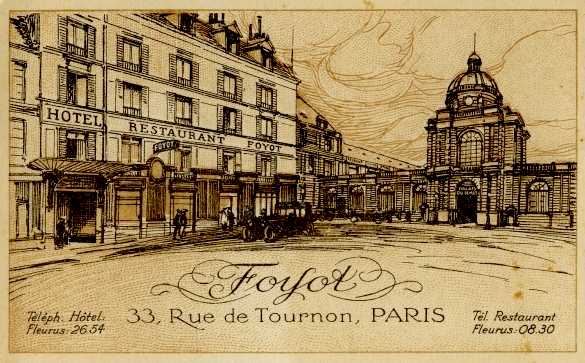
(Foyot's,
which is no longer in existence, was a restaurant situated
on the Rue de Condé in Paris' Latin Quarter. It is the setting
for a humorous short story by W. Somerset Maugham,
entitled The Luncheon. )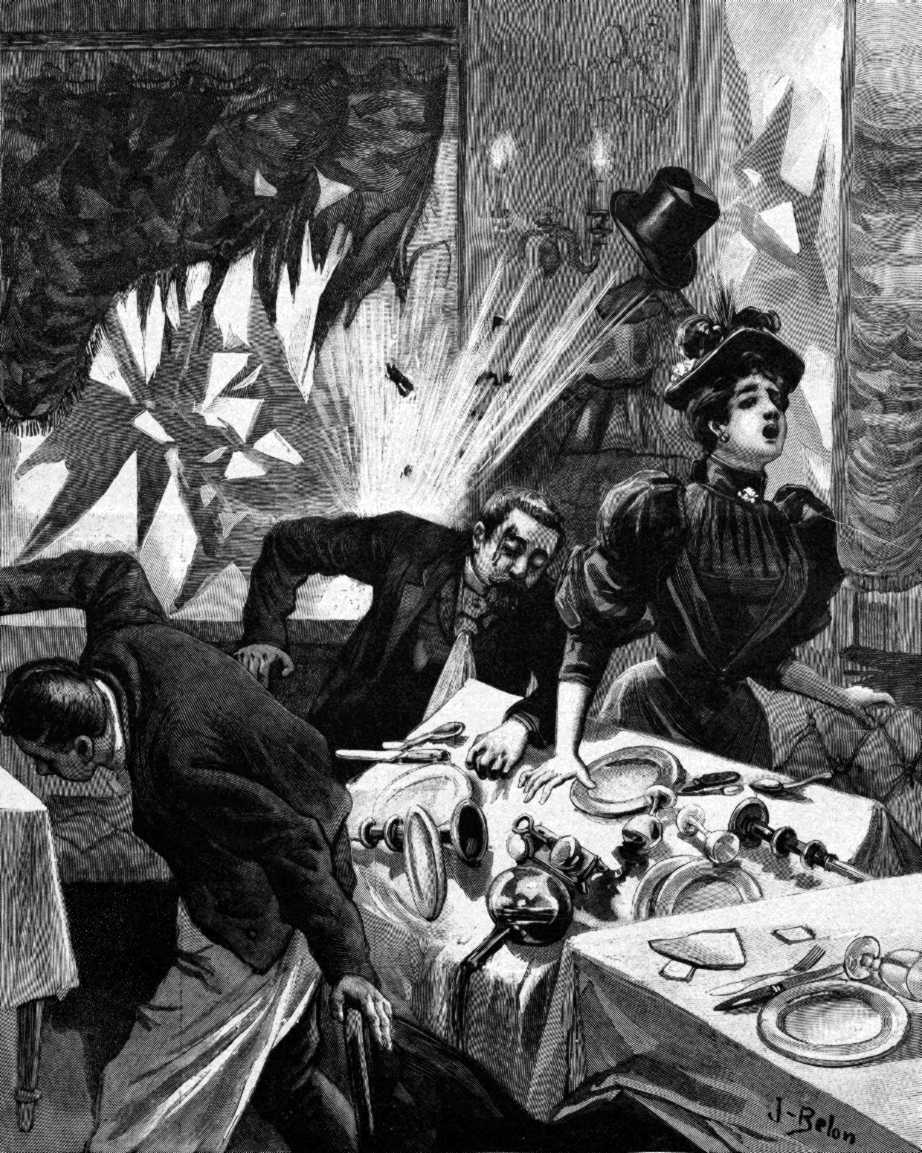


Senate. Some of the wicked English who used to
dine there, on one occasion were discovered popping
an indecent book through the Senators' letter-box.
It was a French one too, which they had bought,
and, owing to its incredible indecency, they were
rather embarrassed with its presence in their hotel.
I met Van Loon at one-thirty asbove. He handed me a
packet of a hundred blank visiting cards and said,
" I dined last night at Larue with two friends of
mine and we did a hundred and fifty drawings; I
thought that you might find these useful for making
drawings in public places. I thanked him and, I
think, we did one or two drawings then to christen
them. He also bought me a history book of his
called Ancient Man which he had illustrated. He
did very amusing little drawings. I wished that,
when I had been a child, I had been given such an
interesting history book, I might have taken some
interest in the subject. We had ordered sole and
on the first page he did a drawing of a sole and
underneath wrote, " To N. H., in memory of a
common sole." I was delighted and we had great
fun. Van Loon drank Vichy water and I had some
wine. Suddenly he said, " My God, this is Thanks
giving Day! I had quite forgotten it, I must give
you a present, what would you like? I could not
think of anything for a minute, but after thinking a
little I said, " I would like a guitar. He said,
" That is splendid, I play the violin myself, and we
will go and inspect the music shops. We went
round the back streets in the neighbourhood of the
Boulevard St. Germain which was quite near. I

tried all the guitars and Van Loon played all the
violins. We could not find anything that we liked
so moved on to the Boulevard Montparnasse.
There were several shops that I knew of there, and
we tried more guitars and more violins. Alas! we
could not find a single guitar that we liked and I
had to content myself with a large bunch of red
roses. He came and sat for me a few days later and
I did a drawing of him which was a bad drawing
but a good likeness. I went often to his hotel near
the Rue de Rivoli, and met his wife " Jimmy who
was charming and we all went to a Russian restaur
ant in the Rue du Bac and dined. I saw them quite
and dined. I saw them quite
often. One day they asked me to go to a large hotel
in the Champs Elysees to dance and have tea or
cocktails. Van Loon fetched me in the Daimler,
which he always had in Paris, As we were walking
down the corridor of the hotel leading to the ball
room I saw, walking ahead of me, a man with a
wonderful figure and wide shoulders. I walked
quickly on and caught him up and saw as I passed
him that he was Carpentier.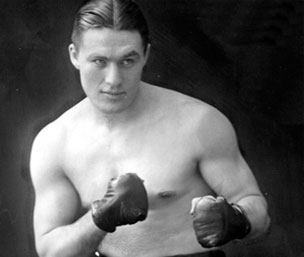
I saw him. dancing
afterwards. "Jimmy" and Van Loon's Dutch
sister were waiting for us. I danced with Van
Loon, who, like nearly all big men, danced very
well. His wife and sister did not care about dancing.
We all left together and stepped into the Daimler.
As we drove away the sister said, " Hendrik, what
kind of men are they that frequent this hotel;
distinguished people, attaches at Embassies, I sup
pose? " Van Loon said, " No, my dear; bastard sons
of bitches! " And Jimmy said, " Oh, Hendrik! "
Nancy Cunard was at this time in Paris and asked
me if I would like to meet George Moore .
.
I was
very much thrilled and felt as if I was going to be
introduced to one of the Old Masters. He stayed
at Foyot's when he was in Paris. He was charming
and asked me to lunch with him in the Place de
TOdeon. I showed him some reproductions of my
paintings, they were nearly all portraits, including
the one of Sickert, He said, " I see you are a clever
woman, but why do you paint people larger than
life? " We went after lunch to the Galeries Durand-
Ruel, and Georges Petit. This was most interesting,
as, of course, George Moore was known there in the
days when he wrote his book on the Impressionists
and the manager said, " Ah, Mr. Moore, do you re
member what Edouard Manet said to you that day
in his studio in 1875? " Impressionist pictures were
brought up from the cellars. Sisleys, Pisarros,
Jondkinds below and Manets, which I had never seen
before. He told me how he had studied Art but
had never found himself until he took to writing.
He said to me, " My dear, you may do a lot with
your talent and your life but not until you have got
a point of view; some day you may develop one.

CHAPTER XII SOUTHERN FRANCE AGAIN
THE Countess A. asked me if I would like to motor
with her from Vichy,
where she was about to take
a cure, to Juan-les-Pins, where her brother-in-law
had a house. She was going alone to Vichy for two
weeks and I was to join her for the last week and
we could motor South together. I had often wanted
to see the Riviera, and was delighted. I arrived at
Vichy one evening after a long dreary journey and
she met me at the station. She thought that I was
lost as the train was about an hour and a half late.
She was not allowed to eat in the evenings, so I had
to dine alone. After dinner we sat and talked till
late in her sitting-room. The next morning she had
to go off early to the cure, and I wandered about the
town. It is a most dismal place, with many Arab
chiefs; and in the gardens are kiosks, one side of
which sit the chiefs and the other side their Arab
servants. Everyone looked bad tempered and
liverish; afterwards I was told that they were all
suffering from that complaint. Before dinner we
went to the Celestin Spring. The first day I hired a
little mug and it was hung up on a hook with the
other mugs. I, of course, was not a patient, but
could drink the waters. I found it so agreeable as it
poured out of the rock and had so much more kick
in it than when it was bottled that I swallowed it in
one gulp, to the horror of the attendant and the
other patients. Afterwards I had to sip it.
I had arrived on a Tuesday and spent most of the

day alone* On the following Saturday the Countess
said, " The motor will come round to-morrow mom-
ing and we will have lunch at Moulins. There is a
fine cathedral and a museum and the food and
wine are very cheap and good in the town/' As we
left Vichy I noticed that the whole population
seemed to be leaving also. The Countess then ex
plained that as the clinics were shut on Saturdays
and the patients were free to do as they liked,
feeling very hungry and well, they took any kind of
conveyance to the country, where they ate and
drank to their heart's content. We visited, first the
cathedral, which has a very fine picture in it, and
then the museum and afterwards a little hotel,
where we had a magnificent dinner and very good
wine. I think the whole bill came only to fifty
francs. We stayed at Vichy for a week and then
started for the South.
It was a most interesting voyage for me, as the
Countess had studied architecture at the Sorbonne
and knew a great deal about French history and
painting. We spent the night at St. Nectaire in
Auvergne; there is a most beautiful twelfth-century
church, where, inside, the pillars are painted and
in a state of almost perfect preservation; also a
twelfth-century statue of Saint Baudime. He is a
most beautiful and rather terrifying figure and had
had an adventurous career, having been stolen
several times from his safe by robbers. We had
lunch at le Puy, which is a most strange place.
There are volcanic rocks, which are very high and
steep, sticking out of the town; on these rocks are

statues and churches. I suppose one has to climb
up them. They are very high and almost perpendic
ular. On the top of one is a statue which looked
to me exactly like the Statue of Liberty, and appar
ently quite as large. It all looks as if it had been
created by Gustave Dore. We found a museum
with many Roman remains and visited the Cathe
dral. We walked round inside, the Countess explain
ing the architecture to me, and suddenly we were
attacked by the rudest and ugliest priest I have ever
seen. He flew at us and told us that we were dis
turbing the people at prayer. We could only see
one person present, and he was asleep. The priest
stormed and the Countess told him what she thought
of him and waved a hippopotamus stick, which she
always carried. She told me that she only wished that
she had had the courage to beat him with it. She
succeeded in frightening him into believing that he
was going to be beaten and he finally slunk away.
We were both trembling with rage and on leaving
the church we found outside a stall, with hand-made
lace and embroidery for sale. A small girl was
standing by the stall. She said that her mother had
gone home for a minute. We asked her what the
priest's name was and told her what a rude, horrible
man he was, knowing that this would be repeated to
her mother, who would, in detail, explain the whole
incident to the entire town. We gathered from the
little girl that Monsieur B. was a far from popular
figure and we left the town triumphantly.
We spent the next night at Alais and from there
we went to Nimes. We took rooms at the Hotel de
Luxembourg 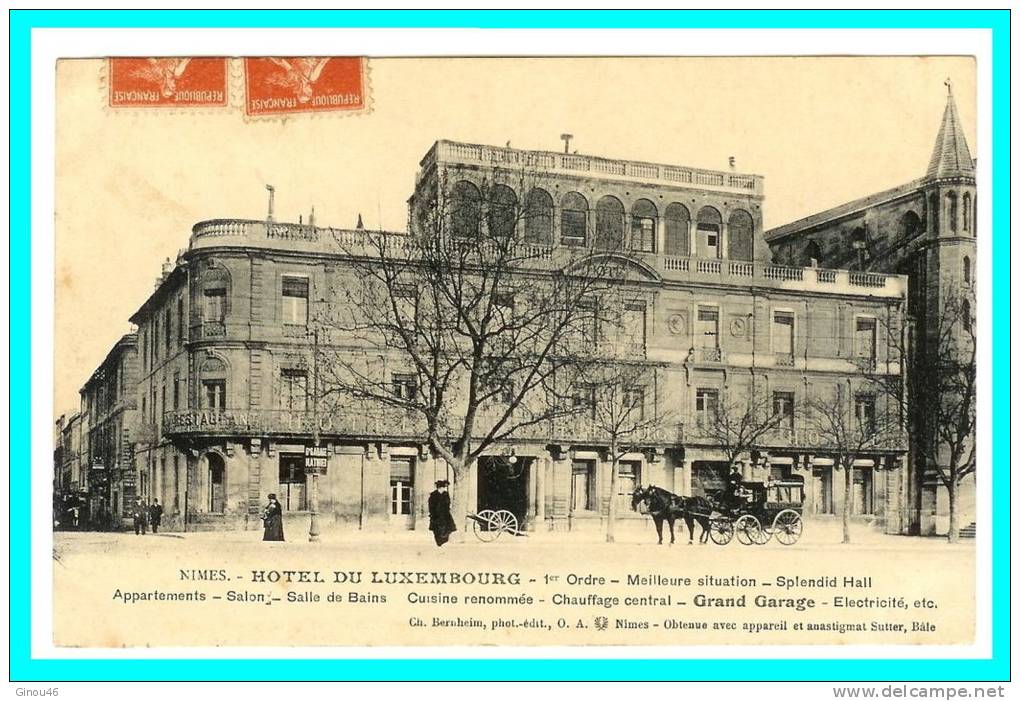 and came out to a neighbouring cafe
and came out to a neighbouring cafe
to have a drink on the terrasse and to buy some
cigarettes. The Countess said, Wait for me, I will
go into the tabac ? and get a paper and some
cigarettes." I waited and she stayed there rather
a long time and came out laughing and said, cc I
have found two of your friends inside. 35 I could
not imagine who they could be. She would not tell
me, but said that they were both men and that they
had arranged for us all to dine together at a restaur
ant opposite the Roman Arena and then go to a
travelling circus that they had found just outside
the town. At seven o'clock we hired a horse-drawn
vehicle that the Americans in Paris call a " sea
going hack " and drove to the restaurant. We
went upstairs and there were F. and R. We were
delighted to meet each other, and as we had a great
deal to talk about, it was a most entertaining dinner
party. F. and R. had just come from a place near
Bordeaux, where Cocteau, Radiguet, and Max
Jacob had stayed. The Countess had hired the
carriage for the evening and after dinner we all
got in and drove to a circus. Afterwards we went
back to our hotel as F. and R. were staying there
too. They had brought several bottles of wine,
called Vin de Carthaglne. They had bought it be
cause they liked its name and also the shape of the
bottles, which had spouts. The wine was very
sweet and sickly. They also had a bottle of PEau
de VArquebuse, which they had bought for the same
reason. This was really terrible, and, as all the
occupants of the hotel had gone to bed, we had to
go to bed ourselves without a drink of any kind.
The next day we had lunch at the hotel as both
my friend and F. and R. knew the proprietor. He
gave us a magnificent lunch and insisted upon us
tasting all kinds of wine from his cellar. After
lunch F. wanted to show me the Roman pond and
fountain in the public gardens. Afterwards F. and
R. had to go and we continued our pilgrimage.

We stopped at Tarascon where the Countess sent
a postcard to Leon Daudet and went and looked
at the fortress. We arrived at Avignon and took
two rooms at a hotel where we found Tommy Earp
and his wife. The next day we all motored to
Villneuf and saw the frescoes in the monastery. We
also went to see the Palais des Papes in Avignon itself.
I have a horror of looking down from high places.
F. has it too, and it makes him really ill if he is
any higher up in a hotel than the first floor. The
tower of the Palace is very high and has more than
four hundred steps. I, feeling brave, walked up it
alone as no one else had the energy. When I got
out on to the roof I could see the country for miles
around. There is a very fine early Corot of this
tower in the National Gallery. There is no railing
round the edge and I thought that I would like to
see if I could really look down. I did for a second
but ran very rapidly away from the edge and down
the four hundred steps. The frescoes in the palace
are most beautiful and perfectly preserved, having
only been discovered under some whitewash, fairly
recently. We went on to St. Remy-en-Provence.
The Countess and I photographed each other
sitting on the Arc de Triomphe. We also saw the
asylum that Van Gogh was in.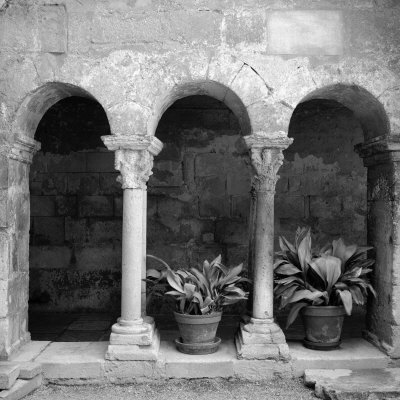
Near St. Remy,is
Les Baux,
a lonely ruined town on a rock. Only
about eighty people live there, it is most grim and
sinister; and after drinking a bottle of very good
white wine we were glad to get away from its
gloomy atmosphere. We passed through Aries,
which is a very bright and gay and paintable place,
which can clearly be seen from Van Gogh's pictures.
I was sorry that we could not stop.
We got to Aix-en-Provence at nine-thirty p.m.
and took rooms at the Hotel des Thermes Sextius.
Darius Milhaud was living at Aix with his family
and we found him the next day. He said that he
would take us and show us over Cezanne's house and
then take us some miles further out to see Mont
St. Victoire, the famous pink mountain. Milhaud
came to our hotel and we started in the motor for
Cezanne's house. It was then owned by some very
bourgeois people. I believe they did quite a trade in
Cezanne's hats. It was curious to see the garden,
as everywhere one saw Cezanne's pictures and how
realistic they are! At the top of the house is a very
small studio where he worked. On one wall was a
large painting of a cow, most certainly not by
Cezanne. We drove on, and saw, on turning a
corner, Mont St. Victoire. It was a high and most
beautiful mountain, much more beautiful and quite
distinguishable from those surrounding it. We
stopped at a little cafe from which we had a fine
view of it. Cezanne used this cafe when he was
alive. We drank some Vin de Tavel, which is a
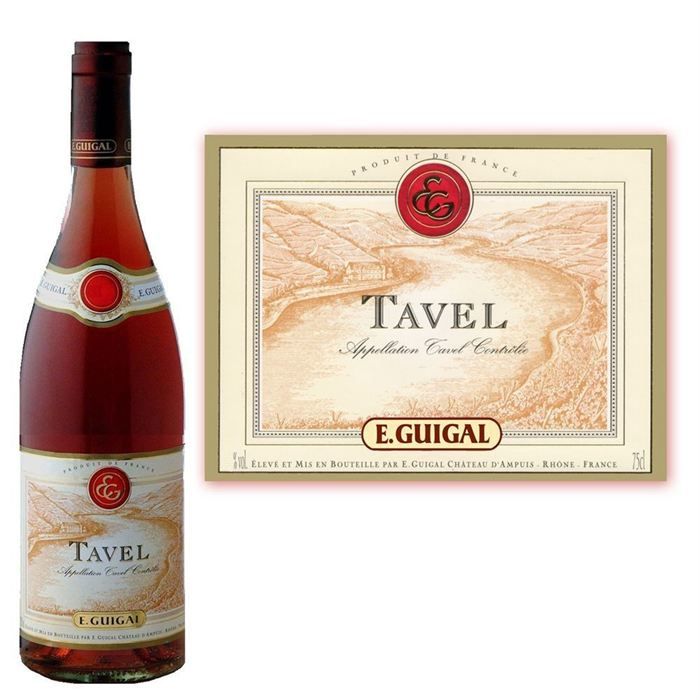
local wine, and found some old-fashioned postcards
of the early 'nineties, representing the smart visitors
to house-parties in the neighbourhood. There was
a particularly fine specimen of a General's house-
party, the ladies wearing leg-of-mutton .sleeves and
sailor hats. We then had tea at Milhaud's parents 3
house. Milhaud told us many amusing stories, one
of Georges Auric, who was very absent-minded and
who was asked to a party. By some mischance he
was not introduced to the great man of the after
noon, the Academician, Edmond Jaloux. Jaloux
came up to Georges and said, " Je suis Jaloux " and
Georges turned round and said, " De qui? " Aix-en-
Provence is a town of fountains. There are several
in the main street, very pretty ones, covered in moss,
with the water dripping from the moss.
We then started on the last lap of our journey.
We had lunch at Brignoles, where all the English
stop on their way South. There is a restaurant
there famous for its ecrevisses. We got to St. Raphael,

where we sat in a cafe by the sea and had a drink.
The weather was beautiful and we felt very pleased
with life. Juan les Pins is not very far away and
we got there about seven-thirty. Our chauffeur
could not find the villa and asked an old man the way.
He directed us and added, " Cest la maison construite
comme urn mine" This did not sound to us very
promising. What he really meant was that it had
a tower with battlements and although quite
modern it was built like an old castle. It was on the
sea with a little garden leading to the sea-shore.
The Prince M. and his wife and daughter and a
crowd of others came out to meet us. The villa
was filled up and so we had to stay at the house next
door. This house was let out in rooms by an Aus
trian Countess. It had been sequestrated during
the War. The Countess was a very beautiful woman
with white hair. My friend had a room at the back.
I thought the whole place most sinister. The room
had a padded door with a tiny window in it that had
bars for someone to peep through at the occupant
of the room. All the windows and cupboards had
wires over them; in fact it was a complete padded
cell. My room opened out of it and faced the sea.
Outside was a small conservatory and then a garden
leading down to the sea-shore. At this time the
Casino at Juan les Pins 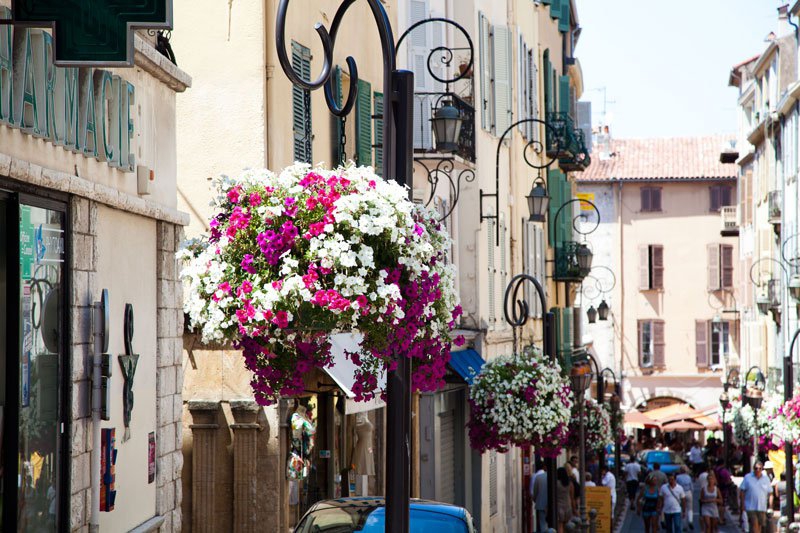 was only partially construc
was only partially construc
ted. The beach was nearly empty most of the time.
We had our meals with the Prince M. and his party.
There was a Russian Baroness staying there who had
gone through the War in the Russian Army as a
Cossack orderly to a general. She had won the St.
George's Cross. I saw a photograph of her in her
uniform. She came from the Caucasus and was short
but very strong. She gave me a Cossack's coat and
some cigarettes. All the servants were Russians and
in the evenings we would sit round a charcoal fire in
the garden with our legs crossed and cook " Shlas-
lik," which is mutton and bacon put on a long
skewer and held over the burning charcoal. We
looked like a gipsy encampment. The Russian
servants had mostly been officers during the War
and had either to be servants or to keep restaurants.
When the whole party went into Nice the servants
would spread themselves round the drawing-room,
drink the drinks, read the newspapers, and smoke
cigarettes. Our rooms always gave me a strange.,
creepy feeling. One evening I decided to go to bed
early and went to my room about nine-thirty.
Some hours later I woke up and found myself star
ing at the window, which was a part of the con
servatory. I was so terrified that the whole bed
shook and it was some minutes before I could turn
on the light. I opened the door of my friend's room
and saw that she was sound asleep. I thought that
there were probably burglars, as she had some
valuable jewellery. I did not think any more about
this until the day we left, and on our way to catch
the train at Antibes for Paris, a Russian lady, who
had been a member of the house-party, said, " Oh,
you know your house was haunted and the last
people had to leave? " I had cold shivers down my
back. I suppose that at some time something awful
must have taken place in the house. I hear that
now it has been turned into a restaurant, as no one
would live in it.
F. and R. were staying at Nice and came over
to see us often. Sir Hugo de Bathe was at Antibes
and came over too. At an enormous house in
Juan itself lived the Hudnuts. Mr. Hudnut's
daughter had married Rudolph Valentino. Sir
Sir
Hugo knew them and one day they asked him if he
would bring his friends to tea, meaning all of us.
Half the party were thrilled but the other half were
too lazy and comfortable at home to move. As
most of our party were poor and the Hudnuts were

rich we decided that, at least, we must make a
good impression. Three of us actually went: Sir
Hugo, who took us, a Russian Count, 
and myself.
We brought two motor-cars with us. The house was
enormous with a huge marble hall with life-sized
bronze statues in Watteauesque costumes. Mr. and
Mrs. Hudnut were there,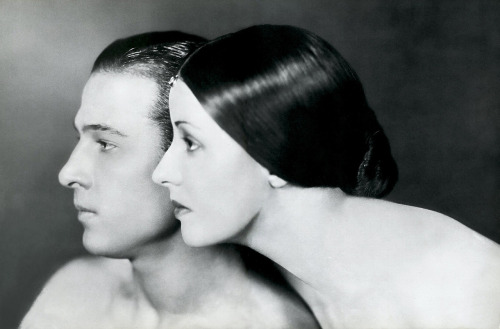 Valentino and his wife,
Valentino and his wife,
and two English people from Nice. Everyone was
rather nervous. In the middle of the room was a
In the middle of the room was a
grand piano. Sir Hugo was looking very imposing
in an enormous check overcoat that looked rather
like a horse blanket, and of which he was very
proud. He explained to the company that I sang
sea shanties and other songs. I was horrified that
I should be made to perform. Valentino sat me
down at the piano and sat on the piano stool with
me. He poured me out some whisky to encourage
me. His wife, Natasha Rambova, sat on the other
side of me. I have no voice but the songs were
I have no voice but the songs were
funny and I can sing in tune, so I got away with it.
I found Valentino charming. He was tall and fine
looking, but, of course, his face was photogenic
and looked much finer on the screen than it did in
real life. At this time I had never seen him on the
cinema as I hardly ever went at all. I think he was
rather pleasantly surprised that I didn't go into
raptures over his performances on the screen. I
talked to him a good deal about myself, which
seemed to amuse him and we got on very well to
gether. After tea and some cocktails we drove away
to a cafe to find our friends, who were anxiously
waiting to hear how we had got on. I was taken to
Nice. This was very interesting to me, as, when I
had been in Russia I had read the life of Marie
Bashkirtseffand was very interested in her. A great
part of her life was spent in Nice. My Countess's
mother-in-law, who was staying at the villa, was a
Russian lady of nearly eighty and had known the
whole BashkirtsefF family and told me a great deal
about them. There is a fountain in Nice in memory
of Marie. I was taken to see this and to the Museum,
where there are some of her pictures and a large
marble figure of her in a smart dress with a bustle.
I am now severely reprimanded, if I ever mention
this lady's name, for being old-fashioned: but I
still have a great deal of admiration for her char
acter. If she had only had the sense to realize that
during her life-time the great man was Edouard
Manet and not Bastion Lepage! She fell in love
with Lepage and was completely influenced by him.
In any case both their paintings seems to lack sensi
bility so completely and to be so sec. Whatever
critics had to say about her, she did influence the
fashions of her time and attained the most amazing
amount of knowledge during her short life.
I was taken to Monte Carlo also, which I thought
was a charming place, and filled with comic police
men and the strangest old Englishwomen who earn
their livings at the Casino. We saw them parading
about the town. I saw one with black stockings
and white shoes, a white coat and skirt, a large
hat with purple flowers in it, and a purple spotted
veil. The whole head-dress looked like a meat safe
covered in muslin. The Lower Corniche was the
most terrifying road that I have ever been driven
on and the Prince drove faster than anyone I had
ever driven with. He tore round the hair-pin bends
just missing the other cars. It was rather a nerve-
racking experience. We had been away from Paris
for five weeks and had to go back* We took the
train from Antibes as the motor had been sent back
a few days before. We had a w agon-lit > which I
found a pleasant change from my journey to
Brittany and Collioure, as one went to sleep in a
comfortable bed and woke up in Paris,
IN the late autumn Paris was very pleasant as all
the tourists had left and only the serious people re
mained behind for the winter. There was a Russian
Ball at the Bal Bullier, arranged by Larionof. 
The
balls at the Bal Bullier were the best of all if one got
in intact. Outside one had to wait in a queue,
sometimes for nearly an hour. One very cold winter
night we had to wait for a long time and the people
behind started rushing the doors. If I hadn't been
protected by two men and a policeman I think I
should have been killed; as it was, a great many
people were badly hmt with the broken glass. B.,
my old friend, the man who had played soldiers
with Tuohy and the champagne bottles outside the
Dome, were at the Ball. When he got excited, after
Mandarin Curasao, he had a passion for climbing.
He would climb anything, trees, church -steeples,
pillars, anything he could find. He found a row of
pillars holding up the balcony and swarmed up one.
After becoming rather tired he descended slowly on
to the head of an infuriated Swedish diplomat. It
required a great deal of tact and some champagne
,to calm the Swede. The little dwarf who played in
Romeo and Juliet was there. He was about three feet
ten high and had a large head. He came dressed as
a baby and wore imitation hands and arms and a
baby's mask over his face. Many people really
thought that he was about four and said, " Va te
coucher! Oil est ta Maman? Cest un scandale" The
dwarf was certainly not younger than thirty-five.
He is an excellent actor and I have seen him in
several French films. I knew him quite well and
one day he came to the Dome in a pair of check
plus-fours with a little gun. He said that he had
been shooting sparrows on his estate; he looked
very funny.
My friend Marie was staying at Foyot's and intro
duced me to a rich man who bought pictures and
had a magnificent collection of old Masters and
sculptures. He was a great friend of Augustus
John's. He asked us to dine with him and we took
him afterwards to see some friends of Marie's,
George Adam and his wife. Pearl, at their flat.
Marie's rich friend came to my studio and bought
some drawings. He knew a great deal about food
and drink and whenever one dined with him it was
a wonderful experience. I took him to see the
Countess A. They got on very well, but I think she
They got on very well, but I think she
found him a little out of date. One day I dined with
him and we decided to go to the Swedish Ballet. It
was not supposed to be very good but some of the
dtcor was interesting and also the music. During the
interval we went to the bar where everyone met. I
found the Countess A., Lady Michelham , and, in a
, and, in a
comer, James Joyce. I introduced them. Joyce
was rather frightened of them at first, but not so
astonished as when, a few minutes later, Valentino
came in and I introduced them both. They were
the last people in the world who I should think
would have met in the ordinary way, and they were
almost speechless.

It sometimes occurred to me that I should go
back to England and live there and that I was not
really getting anywhere either in life or in painting.
Of course, life in Paris for foreign artists is extremely
difficult if they have not enough money coming in
regularly to pay for food and lodging. I could just
scrape along. When I exhibited at the Salon
d'Automne or the Salon des Independants I had
good notices and encouragement from people like
Friesz 
and Brancusi,
and now and then did a drawing
or a portrait which I sold. I had heard that things
were brightening up in London. The Countess A.
asked me to spend a few days at her country house
near Versailles. It was a large converted farmhouse,
It was a large converted farmhouse,
the sitting-room had been a barn and it had been
built with paving stones outside and looked very
much an English country house. It was in the
middle of a large orchard, one part of which was
just a field of rose-bushes. There were several white
goats, including a huge billy-goat, who was tied up
with a chain; he smelt horribly and would make a
dive at anyone who approached him.
I had often spoken of Ronald Firbank, and the
and the
Countess was most anxious to meet him. He had
taken a house at Versailles from a French Colonel,
and we decided to call upon him. I wrote him a
note to say that we were coming. We went to
Versailles the following day. When the motor
stopped we saw a tall figure peering through the
curtains. We were shown in. Ronald was in a
particularly nervous mood that day and shook us
by the hands and rushed to his writing desk, seized
a stuffed bird of paradise, and pressed it into the
hands of my astonished friend. He hardly spoke at
all, but we asked him to lunch the next day, which
was Sunday. One or two people had been invited to
lunch from Paris to meet him and we waited and
waited. After nearly an hour late Ronald appeared
In an ancient barouche which he had hired. He
refused to eat or to drink and hardly said a word.
The minute coffee was finished he presented the
Countess and myself with a copy of his latest book
and made a dash for the barouche, which he had
kept waiting, and returned to Versailles. I was
severely reprimanded for producing an obvious
lunatic, but Ronald was a person who was so
temperamental that he could really not be relied
on to do anything at any stated time.

In the afternoon Cecile Sorel came to tea with
" Coco " Chanel, the Couturiere, and Monsieur and
Madame Van Dongen and several other people.
Everyone spoke French and after tea we drank
cocktails and danced. Van Dongen danced with
Sorel, they both danced marvellously. Van Dongen
is very tall and very thin, with a long beard. Sorel
was not very tall but with a most elegant and
serpent-like figure. Everyone stopped to watch
them and no one else had the courage to dance.
The Countess motored me back to Paris the fol
lowing day. 
A negro night-club had been opened by Bricktop,
a coloured singer. Her name was explained by
the fact that as she was not entirely coloured her
hair was slightly reddish. One night after dinner

I went with the Countess. It was a gay and lively
place and many English people who objected to
spending the night in bed went there as it kept
open as long as anyone was there. I saw across
the dance floor, sitting at a table with two South
Americans, a very beautiful girl. She saw me and
we stared at each other. I waved to her and she
waved back to me. This was a most remarkable
girl who had been at Brangwyns at the same time
as I had. She was Irish and came from a very
good family. She was about fifteen and a half
or sixteen when I had known her first. She aston
ished and rather frightened the whole Art School.
I had not seen her for years. Even when she was at
the Art School she was pursued everywhere by
men; she was even stopped in the street. She was
supposed to be engaged to a bourgeois little man whom
I think she had met at a dance. He was at the time
engaged to some very dull girl. I think it was out of
pure devilry and perhaps the feeling of irritation
that such a silly, stupid woman should have got hold
of any man that she encouraged him. She was so
good-looking and attractive that it needed very
little encouragement, if any. The wretched man
asked her to marry him and she accepted. Of
course, she did not care at all for him, and I believe
that, in despair, at the other girl having refused to
have him back, he jumped off a Transatlantic liner.
I used to gaze in admiration at her and wish that
I was so beautiful. Now that I am so much older I
wonder if it is such an advantage and think perhaps
I. am better off as I am. We rushed across the

dance floor, nearly upsetting the dancers, and em
braced each other. She did not look more than
twenty-two and was marvellously dressed; she had
two large, real pearl necklaces on, and diamond
rings. She had been for some years in South
America and had had so many adventures that she
said it would take weeks for me to hear them all.
I had always called her Prudence; we christened
her by that name at Brangwyns because her con
duct was so rash. She had been a dancer in South
She had been a dancer in South
America and had danced with Pavlova's troupe.
She had now become an acrobatic dancer and
was looking for a job in Paris. She had arrived
at an hotel with two monkeys and a snake, and
a very old and wicked-looking Spanish woman,
who was her maid. The old lady looked exactly
like the keeper of one of the more sinister "Joints "
in Montmartre. The hotel did not consider very
highly the idea of lodging the snake and the mon
keys, but they said that they could stay for the
night. The next morning Prudence went out,
taking with her the maid, who had never been
to Europe before. When they returned they found
the whole hotel in an uproar and a miniature
Niagara Falls pouring down the main staircase.
The monkeys had got into the bathroom and
turned on the taps and hidden themselves. The
snake's behaviour was beyond reproach and it lay
curled up in an armchair. I introduced her to
my friends, who were delighted with her. Her de
scriptions of her adventures were most amusing and 
she did not mind telling them with the fullest detail,

I must say that I think that the fullest details can
be told to a select company of sympathetic people,
but not written down for everyone to read.
She had just taken an apartment in the Bois de
Boulogne on the ground floor. It was horribly dark
and the lights had to be turned on almost the whole
time.
I went to see it the next day. The monkeys
had a whole room to themselves and lived in a large
wooden cage that had been made specially for them.
The snake had disappeared, apparently up a pipe in
the bathroom. We put mice at the bottom of the
pipe to try and entice it out, but nothing happened
except a horrible smell and we think it must have
stuck inside and died there. She had an instructor
who taught her acrobatic dancing; he had worked
in a circus. A mattress was placed in the hall,
which was large, and she, in a bathing dress, would
do remarkable feats with her anatomy. We
christened the instructor Adalbert, because his
name was Albert. He would roar instructions at
her. Acrobats are fiends and nearly always want
everyone else to become one. Prudence and Adal
bert did their best to induce me to break up my
extremely well-preserved anatomy, but I firmly re
fused. I introduced her to many people and they
all liked her and found her most entertaining. We
also went about a good deal together and I had a
wonderful time.
I saw Pascin from time to time. His studio was
always filled with the most extraordinary mixture of
people. He had the genuine descendant of the
Baron Munchausen, who was a shy young man,
many Germans, generally some negresses, and
several artists' models. One day when I arrived a
terrible battle was in progress between a young lady
from the south and another one from the north.
Hair was being pulled out and they had to be
forcibly separated. There was a very amusing
young model who came from the north, who was
known as " Lafille du cure" At any party she would
always undress. She was quite small in height, had
long golden hair below her waist, rosy cheeks, and
a fine and not too much developed figure. She was
a most charming and unspoilt creature. She had
been at the Folies Bergeres and danced very well.
On this occasion there were three very bourgeois
negresses sitting in a row. Pascin had collected
them from some place in Montmartre, certainly not
a night-club, for they were the height of respecta
bility and looked rather startled at the chaste but
nude dance of the Fille du cure. Pascin said that
there was a party that we must all go to, the other
side of Paris, near the Rue de Vaugirard, and that
we should take our food with us. We collected string
bags and baskets and the Fille du curt and the negresses
and went shopping. We bought sausages, wine,
olives and ham, and took several taxis, as there were
about twelve of us. The party was held in a large
studio. The three negresses sat in a row and said
nothing. La fille du cure stoked up the fire and re
moved her clothes. No one took much notice of her
as we had seen her performances so often. The host
told us to collect some more people, so several of us
went to the Dome and the Rotonde. I found there
a well-dressed young Englishman who had just left
Oxford. He came along. He looked so respectable
that we made him dance a tango with La fille. I
think he felt that he really was starting out on a
career of adventure. Pascin suggested that we
should remove the negresses' clothes. We ap
proached one and induced her to remove her dress.
She wore purple cotton underclothes and looked so
dreadful that we urged her to replace it. Parties in
Paris are always supposed to be so wicked and
immoral, but I can't say that I have ever, during
the whole of my career, seen or taken part in any
thing worse than I have so far described. It is true
that I have been asked to places where I suspected
that things would get rather rough and so have
refused.
Pascin asked me to sit for him. He did a portrait
of me which he did not like and, I think, destroyed
it. One day I was dining in Montmartre with him
and some of his German friends. After dinner we
were sitting in a cafe drinking coffee and he was
talking about Les Belles Poules, and how he had
done many drawings there. I said, " What kind of
place is that? " He said, " Cest un bordel: est-ce
que vous riavezjamais itt Id? " I had to confess that
I had not. He said, " Then we will go now. We
will go back to my studio and get some paper and
pencils and spend the evening drawing the girls. 35
The Belles Poules is near the Boulevard Sebasto-
pol and we went down a long passage. 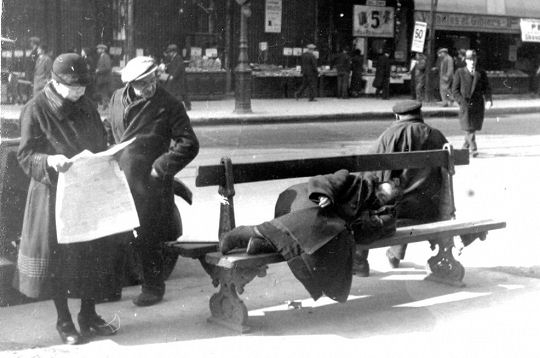
The
patronne was a most evil-looking old lady, exactly
like a drawing by Toulouse-Lautrec. The walls
were covered with tiles, representing the Palais de
Versailles. Floating on the lakes were swans and
seated on their backs were nude ladies, clothed only
in black stockings. This made a strange and rather
beautiful background for the inhabitants of the
cafe. A very loud mechanical piano was playing.
We sat down at a table and the girls stood in a row
in front of us. Everyone who comes in has to choose
a girl to drink with and dance with. There were
about eighteen of them, very heavily painted and
with very little on. They all wore socks and high-
heeled shoes. Their hair was most elaborately
curled and some wore coloured bows of ribbon; it
would have made a marvellous painting. They
lined up and said, " Ckoisissez, Monsieur, 'Dame"
I chose a large, fat one, with red hair and Fascia
chose a small and I thought, rather disagreeable
young woman. They said they would like some
wine. We asked them if we might do drawings of
them. They were delighted and sat motionless for
about ten minutes. All the other girls crowded
round and left their men and insisted on sitting for
us too. They took each of our drawings, folded them
up and put them down their socks. They kept their
money there and, as we explained that we found
their conversation and company quite sufficient, we
had to produce ten francs from time to time. At
12 o'clock we were quite exhausted, I had done
eighteen drawings. I took a taxi and went home.
Pascin stayed behind and made friends with the
red-headed one, who told him the story of her life.
Poor Pascin is now dead. He became very depressed
and suffered a lot from his liver and, I think, felt
that he had worked himself out. He hanged himself
and cut his throat.
F. and R. had gone to live in the South of France.
They had taken a small villa some miles from
Hyeres, on the coast, and had frequently asked me
to stay with them. I was generally in debt in Paris
and could not go, but one day an Englishman came
over and bought a painting and I wrote to say that
I would come down. I took a train for Toulon;
it was, of course, late and I had to take a taxi eventu
ally from Hyeres. Harry Melvill was staying there
too. The Villa was owned by an eccentric Professor
of Harmony from the Sorbonne, Monsieur Koechlin,
who appeared generally with a sack. There was a
fat and most wonderful cook and two Russian men
servants. The only shop was the Post Office, kept
by Madame Octoban. She was the postmistress and
had a cafe, also a shop. Round the countryside
were dotted villas. In order to get to the Post
Office we had either to walk along the sea-shore or
along the railway line. A very small train crawled
along an absurdly small line at the bottom of our
garden. That was at the back of the house, the
front looked on the sea. We could bathe from the
rocks below. F. refused to, as he said that no one
would admire his figure, but R. and I did, and lay
about on the rocks in the sun.
Georges Auric, I knew, was coming to stay after
Harry Melvill had left, and about a week after my
arrival he turned up, I had met him often at the
Boeuf, but I did not know him at all well and re-
garded him as a rather terrifying person. The day
after he arrived,, F. and R. had to go to Cannes.
They had seen a most beautiful old Chateau with
ninety acres of land, on the top of a hill. It had
not been inhabited for a long time and was for
sale. They said that they would be gone for a
day or so and told Georges and I to take care of
the house and entertain each other. They left early
in the morning and I gave one despairing look at
the fat Georges, and went into the garden and sat
under the trees amongst the freezias, which were in
bloom and smelt very nice. I was wondering
whether or not to just walk away into the landscape
and not come back at all, when I heard, " Je cherche
apres Titine " played, not once, but thirty-five times
on the gramophone. I thought that Georges must
either be a very interesting person or to have become
suddenly demented. I returned to the house and
the Russian butler brought us some cocktails.
Neither Georges nor I knew how to open the shaker.
We finally discovered and made some more and by
the time that lunch appeared we were on very good
terms. He explained at lunch that he had just come
from Monte Carlo, where he had been with Diaghi-
lev, Stravinsky, and the ballet, and had written
two acts of a new ballet called " Les Matelots" It
was all about sailors and sounded most interesting.
He said that he had come to stay with F. to write
the last act. He said he had so far got no ideas
about it and was getting rather worried. I said,
" When we have finished lunch I will teach you all
my English sea songs, you will soon learn the
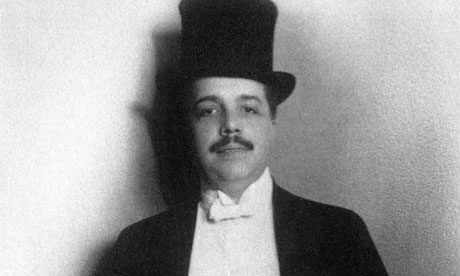
accompaniments and that will give you an inspiration
tion. hemingway
hemingway

" We all met





I looked in horror at it and said, " You





and dined. I saw them quite

 .
. 

and came out to a neighbouring cafe




was only partially construc
Sir

Valentino and his wife,
In the middle of the room was a
I have no voice but the songs were

They got on very well, but I think she
, and, in a


It was a large converted farmhouse,
and the

She had been a dancer in South


hemingway


















No comments:
Post a Comment